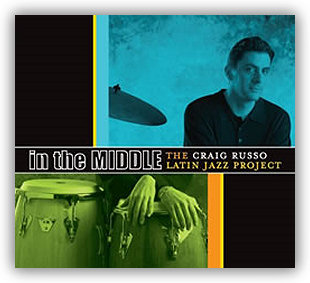|


© 2008 Cagoots records (700261226279)
|
The Craig Russo Latin Jazz Project
In The Middle
1. Pent-up House 
2. Dona Maria
3. Arrival
4. Rumble, Young Man, Rumble
5. Butterfly
6. What Are You Doing the Rest of Your Life?
7. Chip's Vision
8. A Visit to the Bob
9. Besame Mucho 
10. I'm Getting Sentimental Over You 
Hip Mcneill - tenor saxophone (1-3,
6-10), soprano saxophone (4,5)
Tito Carrillo - trumpet (2, 7-10)
Jeff Helgesen - trumpet (1, 3-6)
Chip Stephens - piano
Josh Walden - bass
Craig Russo - drums (2,5,6,9,10), congas (1-5,7-10), güiro,
chékere, other percussion (1,3-10) bongo (6)
Jeff Magby - drums (1,3,4,7,8), congas (6), timbales (1,4)
Ricardo Flores - Brazilian percussion on Doña Maria (2)
|
In 2002 Craig Russo gave life
to the Latin Jazz Project, presenting a few of the most interesting musicians
from the area that encompasses S. Louis and Chicago: the stylistic imprint comes
predominantly from the blue notes as much as it does to the Afro-Caribbean, an amalgamation
with a modern signature, with what appears to be an intention to explore the creative
possibilities that are offered by the two genres.
The percussionist has paved a way in which to
be able to enter into contact with such hybrid aesthetics, this is in relation to
the period in which has studied in Cuba under the maestros such as Enrique Pla
and Roberto Vizcaino, who have behind them twenty good years of jazz experience
with various groups in the mid-western states and from the East coast of the U.S.A.
(from which comes the motive behind the album title).
For the realisation of this project - as well as calling himself - among
the others we can find players such as Chip McNeill on the tenor sax (already
with Maynard Ferguson and Arturo Sandoval), Chip Stevens on the piano (Michael
Brecker and
Bobby Watson), the trumpeters Jeff Hegelsen (Ray Charles
Orchestra) and Tito Carrillo (Kurt
Elling and Tito Puente): a choice – among many of the many Latin
that are emerging not only in the United States but all over the world - that also
distinguishes itself by a way of an expressive strength and musical maturity.
The 10 tracks present an original phrasing, elegant solos of a
timbric bop, combinations of weaving rapids, syncopated rhythms that are
played opportunistically between the improvisations of the brass, and when they
provide the chromatic and introspective light and free interpretations to the melody:
the ability to run along with these ideas that are more complex from a creative
side of things demonstrate and put on show a connection with the "blues"
tradition, add onto this a background of Latin accents that allow the band to "see"
the pentagram's from a singular prospective, all this add to a feeling which is
overall just a feeling of great pleasure.
From the rest of what is presented here the tracks would seem to reveal
an even more ingenious side of the L.J.P., in relation to the selection of the compositions
that are a little less common, and certainly not always noted, it offers articulation
towards ideas that are somewhat less than usual but which also lay down the law
with their lyrics, solar in their rapid dispersal of notes, in the all intensive
bop, in the bluesy attitude of the distinct execution between the
various textures from the harmonic side of the works, second only to an intelligent
style, professional - and as much open as it is interesting. It re-reads out aloud
to us its standards: such as in "I'm getting sentimental over you", almost
reinventing the mambo style, or in "Pent-up House" by
Sonny Rollins,
or, with an all Caribbean soul in "Bésame mucho" by Consuelo Velazquez.
Craig Russo states, in the covering notes, to have had the privilege of
playing with "a group of extraordinary soloists that, through multiple modes,
have taken all of their deepest interpretations and have filled this with creativity",
such a collaboration, in the opinion of who writes this, leaves a tempestic dimension
of good taste and, of Craig, an elegant timing, a rhythmic tactus
that is everything else but aggressive, personally and clear in its refinement.
Fabrizio Ciccarelli
Insert an opinion
This page has 757 hits
Publishing Date: 29/03/2009

|
|

